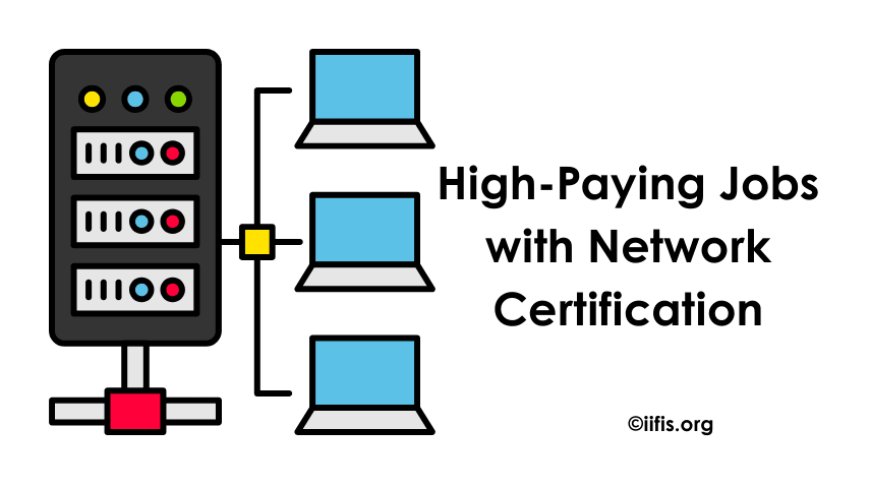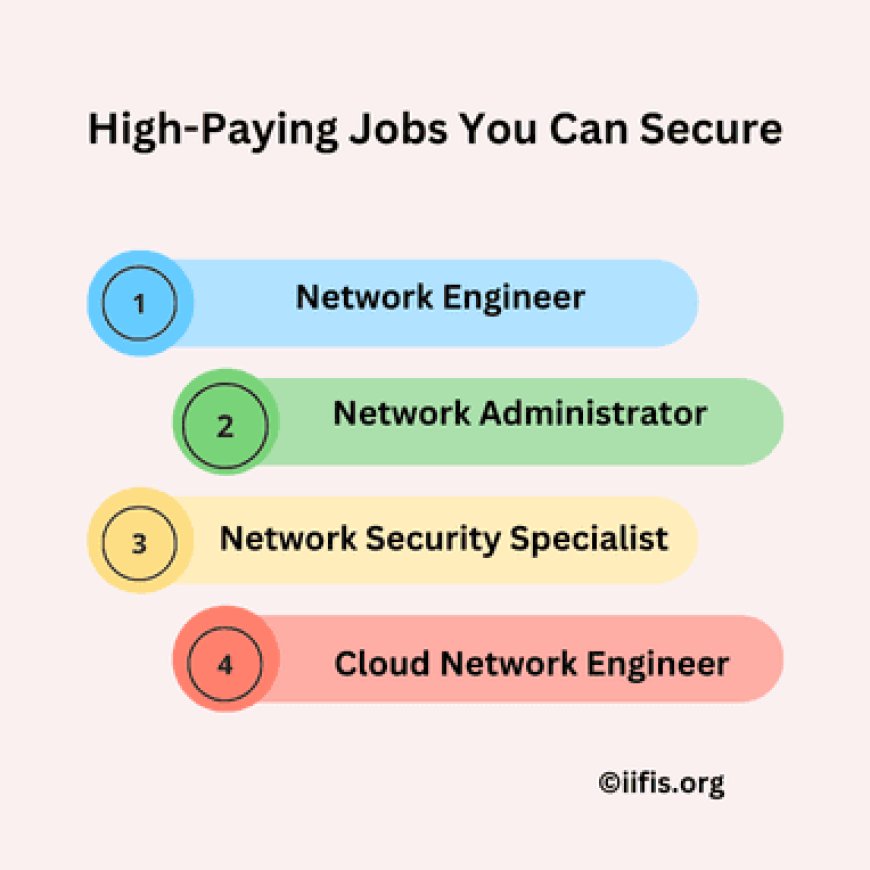Secure High-Paying Jobs with Network Certification
Unlock lucrative career opportunities with a network certification. Learn how earning certifications like CCNA, CompTIA Network+, and CISSP can help you secure high-paying jobs in the IT and networking industry.

The demand for skilled cybersecurity professionals is higher than ever. With increasing cyber threats and data violations , companies are investing heavily in securing their networks and protecting sensitive information. Earning a network security certification not only demonstrates your expertise in protecting these critical systems but also opens the door to high job opportunities. In this blog, we’ll explore how obtaining a network security certification can boost your earning potential, improve your career prospects, and help you secure high-paying jobs in the rapidly growing field of cybersecurity.
What is Network Security?
Network Security refers to the practices and technologies used to protect the integrity, confidentiality, and accessibility of data and resources within a network. It involves protecting a network from unauthorized access, cyber threats, and attacks such as hacking, malware, and denial-of-service (DoS) attacks. Network security encompasses a variety of measures, including firewalls, encryption, intrusion detection systems (IDS), virtual private networks (VPNs), and secure access controls. The goal is to ensure that sensitive information remains safe, systems are kept secure, and users can confidently communicate and exchange data within a network environment.
Why Network Certifications Matter for Career Growth
In the fast-evolving world of IT, network certifications are essential credentials that validate a professional's knowledge and skills in managing and securing networks. These certifications demonstrate a mastery of specific technologies and are widely recognized in the industry. They serve as proof of your expertise, showing employers that you have the practical skills necessary to handle complex network environments.
Industry-recognized certifications such as CompTIA Network+, Cisco CCNA (Cisco Certified Network Associate), and Juniper JNCIS (Juniper Networks Certified Specialist) are highly sought after by employers. These certifications cover fundamental and advanced topics in networking, from network protocols and hardware to troubleshooting and security.
By earning network certifications, you not only improve your technical skills but also boost your credibility within the IT industry. They help set you apart from other candidates, significantly improving your job prospects. Certifications show that you're committed to professional development, making you a more attractive candidate for high-paying roles in networking and IT security.
Top Network Certifications that Lead to High-Paying Jobs
1.CompTIA Network+
The CompTIA Network+ certification is perfect for entry-level networking professionals. It covers essential networking concepts like troubleshooting, networking technologies, and protocols. This certification is a great starting point for IT professionals, helping them secure foundational roles such as network support technician and junior network administrator.
2. Certified Network Associate (CCNA)
The CCNA certification is a must-have for network engineers and administrators. It focuses on networking fundamentals, including IP connectivity, security, automation, and troubleshooting. CCNA is widely recognized in the industry and can open doors to high-paying positions like network engineer and systems administrator.
3.Certified Information Systems Security Professional (CISSP)
The CISSP certification is designed for those specializing in network security. It is one of the most prestigious certifications in cybersecurity and is ideal for professionals who want to pursue roles like network security consultant, cybersecurity analyst, or chief information security officer (CISO). CISSP covers network security architecture, risk management, and cryptography.
4.Juniper Networks Certification Program (JNCP)
Juniper’s JNCP offers a range of advanced certifications for network professionals specializing in Juniper Networks technology. JNCP certifications are perfect for those looking to work with large-scale network infrastructure, often in high-demand roles such as network operations engineer or network architect.
Benefits of Earning Network Certifications
-
Access to High-Paying Jobs and Promotions
Network certifications open doors to lucrative career opportunities. They qualify you for high-paying roles such as network engineer, security specialist, and cloud architect. Additionally, they make you a prime candidate for promotions within your organization, leading to faster career growth. -
Increased Technical Knowledge and Expertise
Certifications provide in-depth training in networking technologies, from basic concepts to advanced strategies. This technical expertise allows you to handle complex network environments with confidence, giving you a competitive edge in the field. -
Higher Credibility with Employers and Peers
Network certifications boost your credibility and trustworthiness in the IT industry. They signal to employers that you're not only skilled but also committed to staying current with industry standards, enhancing your reputation among peers and managers alike. -
Industry-Specific Opportunities
Certifications can lead to specialized opportunities in booming sectors like cybersecurity and cloud computing, where networking expertise is highly sought after. Certifications such as CISSP or AWS Advanced Networking are especially valuable in these fields. -
Potential to Specialize
Certifications enable you to specialize in specific areas such as wireless networking, security, or cloud networking. This focus allows you to tailor your career path to your interests and strengths, positioning you for niche roles with high earning potential.
High-Paying Jobs You Can Secure with Network Certifications

1. Network Engineer
-
Role Overview: Network Engineers design, implement, and manage an organization’s computer networks, ensuring they operate efficiently and securely.
-
Skills Required: Proficiency in network hardware, routing, switching, and security protocols. Certifications like CCNA or CompTIA Network+ are valuable.
-
Expected Salary: ₹4-12 lakh per annum, depending on experience and the complexity of the network systems handled.
-
Network Administrator
-
Responsibilities: Network Administrators are responsible for maintaining and troubleshooting network systems, ensuring connectivity and performance for users.
-
Job Outlook: Strong demand as businesses continue to digitize their operations.
-
Average Salary: ₹3-8 lakh per annum, with potential for growth as expertise and responsibilities increase.
-
Network Security Specialist
-
In-Demand Skills: Expertise in protecting networks from cyber threats, securing firewalls, managing security protocols, and conducting vulnerability assessments. Certifications like CISSP or CompTIA Security+ are essential.
-
Earning Potential: ₹6-15 lakh per annum, with top-tier specialists earning even more as cybersecurity threats grow.
-
Cloud Network Engineer
-
Importance: As cloud computing expands, professionals skilled in setting up and managing cloud networks are in high demand. Certifications like AWS Advanced Networking or Microsoft Azure Networking are advantageous.
-
Salary Insights: ₹7-16 lakh per annum, with demand increasing as more companies migrate to cloud infrastructures.
-
IT Support Specialist/Analyst
-
Entry-Level Roles: For those just starting with certifications, IT support specialists help troubleshoot network and hardware issues, providing a stepping stone to more advanced roles.
-
Average Salary: ₹2-6 lakh per annum, depending on experience and additional skills.
-
Wireless Networking Engineer
-
Growing Demand: As wireless technologies become critical in industries like telecom and IoT, the need for specialists in wireless network design and troubleshooting is rising. Certifications like CWNA (Certified Wireless Network Administrator) are beneficial.
-
Expected Salary: ₹5-12 lakh per annum, with significant growth potential as demand for wireless solutions increases.
network certifications not only provide access to well-paying jobs but also offer continuous career advancement as technology evolves and demand for skilled professionals rises.
How to Choose the Right Network Certification for You
-
Assess Career Goals and Skills
Identify your long-term goals and current skill level. Beginners should opt for entry-level certifications, while experienced professionals can pursue advanced ones. -
Entry-Level vs. Advanced Certifications
-
Beginners: Start with CompTIA Network+ or CCNA for foundational knowledge.
-
Experienced: Consider advanced options like CISSP for security or AWS Advanced Networking for cloud networking.
-
Specialization Options
Choose a niche area if interested: -
Security: CISSP, CompTIA Security+
-
Wireless: CWNA
-
Cloud: AWS Advanced Networking, Azure Networking
-
Industry Demand
Research which certifications are most valued in your target industry to align with employer preferences and boost job prospects.
How to Prepare for Network+ Certification Exams
-
Study Resources
Utilize available study resources like: -
Certification Guides: Official guides from certification providers (e.g., CompTIA, Cisco) cover exam objectives in detail.
-
Build a Study Plan
Structure your study plan based on the exam content. Break it down into manageable topics, schedule daily study sessions, and prioritize areas where you need improvement. -
Practice Exams and Hands-On Training
-
Take practice exams to familiarize yourself with the format and identify weak areas.
-
Use virtual lab environments to gain hands-on experience with networking tools and configurations.
-
Time Management
Set realistic goals and stick to a study schedule. Allocate time for review, practice exams, and hands-on labs, and avoid last-minute cramming.
By using a combination of these resources, practicing regularly, and managing your time well, you’ll be well-prepared to pass your network certification exam.
Leveraging Your Network Certification for Job Opportunities
-
Showcase Your Certification
Highlight your certification on your resume, LinkedIn profile, and during job interviews. Stress it in your skills section and provide examples of how it has improved your technical abilities and knowledge. -
Networking and Job Boards
Connect with industry professionals through networking events and LinkedIn groups. Use job boards like Indeed, Dice, and LinkedIn Jobs, which often prioritize certified candidates in their searches. -
Freelancing and Consulting
Certifications can open doors to freelancing or consulting roles. Market your expertise on platforms like Upwork and Freelancer, offering services such as network design, security consulting, and troubleshooting. -
Advancing Your Career and Negotiating Salaries
Use your certification as use for promotions or salary negotiations. Highlight your skills during performance reviews, or when applying for roles, to justify higher pay based on your validated expertise.
By strategically showcasing your certification and engaging with professional networks, you can unlock job opportunities, freelance projects, and career advancements with increased earning potential.
Future-Proofing Your Career: Keeping Certifications Current
-
Recertification Requirements
Many certifications, like CCNA and CompTIA Network+, require recertification every few years. Keeping your credentials updated ensures you stay relevant in a fast-evolving industry and maintains your credibility with employers. -
Stay Updated on Industry Trends
Networking technologies and standards are constantly changing. Stay informed on emerging trends like SDN (Software-Defined Networking), 5G, and cloud networking to remain competitive in your field. -
Continuing Education and Advanced Certifications
Explore options like CompTIA Continuing Education (CE) programs or pursue advanced certifications such as CISSP or AWS Advanced Networking to expand your expertise and open doors to higher-paying roles. -
Build a Long-Term Learning Plan
Continuous learning is key to a long-term career in networking. Plan for regular skill updates through courses, industry conferences, or certifications to keep your knowledge fresh and ensure sustainable career growth.
By staying current and continuously enhancing your skills, you’ll secure your position in the rapidly advancing networking industry.
Network certifications play a crucial role in securing high-paying jobs and advancing your career in IT. They not only validate your technical expertise but also make you more competitive in a fast-growing industry. Whether you’re just starting out or looking to specialize in areas like security or cloud networking, earning a certification can open new doors and significantly boost your earning potential.
At IIFIS (International Institute of Financial and Information Security), we encourage you to take the first step toward your career goals by choosing a certification that aligns with your interests and professional aspirations. To stay competitive, continue to update your skills through advanced certifications and keep learning about emerging technologies. This dedication will ensure long-term success and growth in the IT networking field.
























